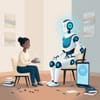Recent studies have compared the effectiveness of human therapists and AI chatbots in delivering cognitive behavioral therapy (CBT), with mixed results. A study presented at the American Psychiatric Association's Annual Meeting found that human therapists outperformed ChatGPT-3.5 in key domains such as agenda-setting, eliciting feedback, and applying CBT techniques.
In this study, human therapists were rated as highly effective by 29% of survey participants, while less than 10% gave the AI therapist the same rating. The AI therapist was viewed as more rigid and impersonal, despite receiving similar ratings to human therapists in understanding patients' internal reality.
However, another study published in PLOS Mental Health found that ChatGPT's responses in psychotherapy scenarios were often rated higher than those written by human therapists. Participants in this study struggled to distinguish between AI-generated and therapist-written responses in couple's therapy vignettes. ChatGPT's responses were generally longer and contained more nouns and adjectives, providing greater contextualization.
The findings suggest that while AI-based therapy may not be suitable for standalone use, it could potentially serve as an adjunct to human therapy or provide support in situations where human therapists are not available. Further research is needed to determine the optimal role of AI in mental health care and to ensure that AI models are carefully trained and supervised by responsible professionals


